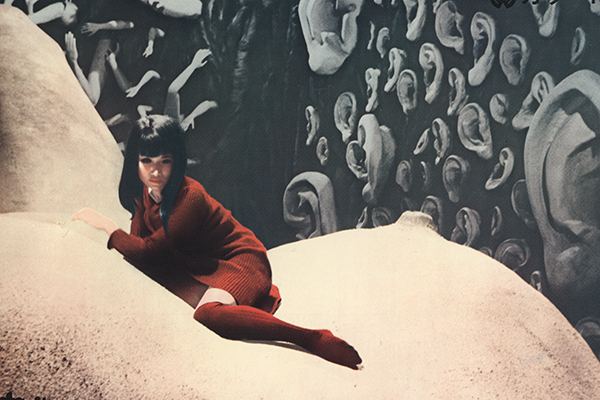Yasuzo Masumura,
filmmaker
PostED ON 12.10.2024
Yasuzo Masumara is the filmmaker of great disruptions. It is thus not-surprising that all his bios credit him as the ‘precursor of the Japanese New Wave’, which ran between 1950 and 1960 and included directors such as Nagisa Oshima and Shohei Imamura, who also had a fantastical-obsessive streak. Born in 1924, Masumara explored the delirious, the profoundly lyrical, pushing to the bitter edge of his country’s society, which had just emerged from WWII, crushed and defeated.

The Blind Beast by Yasuzo Masumura, 1969 © The Jokers Films
As illustrated by his highly distinctive and prolific oeuvre of 57 films made between 1957 and 1982, Masumara had an unusual career. A student in Rome, he was in contact with Antonioni, Fellini and Visconti, larger-than-life figures who were highly inspired by the body, in many cases, the female body. Upon his return to Japan, Masumara also delivered his version of the lives of women, whose bodies were swept away by feelings taken to the extreme. “Women are more human,” he said, before adding: “Men live only for women.”
Whether it featured lesbian passion in A Wife Confesses (1961), a woman accused of intentionally murdering her husband in Swastika (1964), or a prisoner climbing gigantic female bodies created by a mad, blind artist in The Blind Beast (1969), these films (restored in 4K, currently on video and slated to run in cinemas in 2025 thanks to The Jokers Films) were permeated by excess and courage. These heroines had to show and speak themselves without restraint because there was no alternative. Masumara's work remains remarkable for its vital subversion, its superb graphics dedicated to the freedom of certain individuals, particularly women. It's about going to the limits of oneself, whatever the cost, in such a powerful personal way that it becomes a cinema of political intimacy.
Virginie Apiou
Masumura on the programme
A Wife Confesses by Yasuzo Masumura (Tsuma wa kokuhaku suru, 1961, 1h32)
Institut Lumière (Villa) sa 12 19h30 | Institut Lumière (Villa) sa 12 19h45 | Pathé Bellecour di 13 16h45 | UGC Confluence me 16 13h30
Swastika by Yasuzo Masumura (Manji, 1964, 1h31)
UGC Confluence lu 14 16h45 | Institut Lumière (Villa) je 17 18h15 | Institut Lumière (Villa) je 17 18h30
The Blind Beast by Yasuzo Masumura (Moju, 1969, 1h24, Prohib. ages -16)
Institut Lumière (Hangar) lu 14 22h | UGC Confluence je 17 19h15

